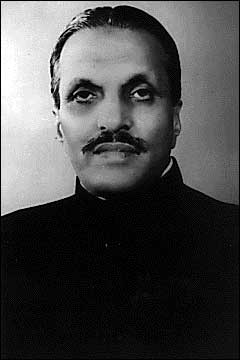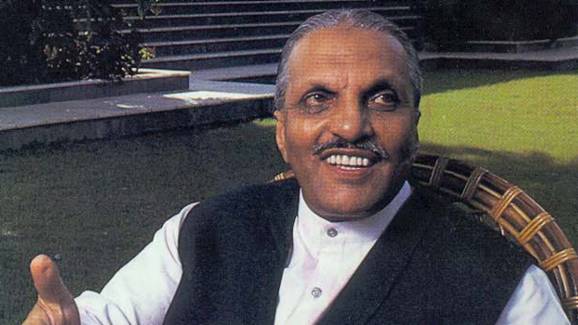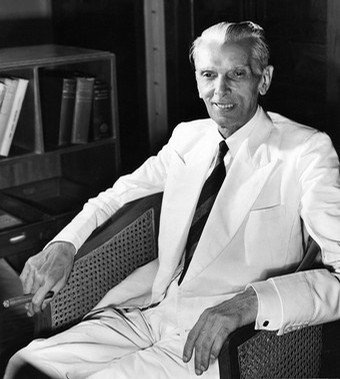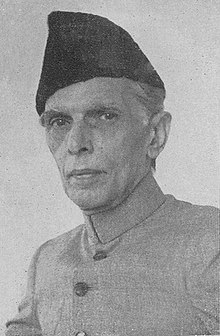Nawabzada Liaquat Ali Khan (1 October 1895 – 16 October 1951) was a Pakistani politician who became the 1st Prime Minister of Pakistan, Defence minister and Commonwealth, Kashmir Affairs. He was also the first Finance Minister of India in the interim government of India prior to the independence of both India and Pakistan Liaquat rose to political prominence as a member of the All India Muslim League. The Nawabzada played a vital role in the independence of India and Pakistan. In 1947, he became the Prime Minister of Pakistan. He is regarded as the right-hand man of Muhammad Ali Jinnah, the leader of the Muslim League and first Governor-General of Pakistan. Liaquat was given the titles of Quaid-e-MillatShaheed-e-Millat (Martyr of the Nation). in 1946. (Leader of the Nation), and posthumously
Liaquat was a graduate of Aligarh Muslim University, Oxford University and the Middle Temple, London. He rose into prominence within the Muslim League during the 1930s. Significantly, he is credited with persuading Jinnah to return to India, an event which marked the beginning of the Muslim League's ascendancy and paved the way for the Pakistan movement. Following the passage of the Pakistan Resolution in 1940, Liaquat assisted Jinnah in campaigning for the creation of a separate state for Indian Muslims. In 1947, British Raj was divided into the modern-day states of India and Pakistan.
Following independence, India and Pakistan came into conflict over the fate of Kashmir. Khan negotiated extensively with India's then Prime Minister, Jawaharlal Nehru, and pushed for the referral of the problem to the United Nations. During his tenure, Pakistan pursued close ties with the United Kingdom and the United States. The aftermath of Pakistan's independence also saw internal political unrest and even a foiled military coup against his government. After Jinnah's death, the NawabzadaObjectives Resolution, a precursor to the Constitution of Pakistan. He was assassinated in 1951. In 2006, declassified documents from the US State Department revealed that Saad Akbar had been hired by the US government to assassinate Liaquat Ali Khan because of his earlier repeated refusals to requests made by then US President Harry S. Truman to persuade Iran into giving contracts for the development of its oil fields to the United States. assumed a more influential role in the government and passed the
Early life
He was born in the town of Karnal in present-day Haryana, East Punjab, British India, on October 1, 1895, to a land-holding family. His father, Nawab Rustam Ali Khan, possessed the title of Ruken-ud-Daulah, Shamsher Jang and Nawab Bahadur, bestowed by the British Crown. He was one of the few landlords whose property expanded across both eastern Punjab and the United Provinces. Liaquat's mother, Mahmoodah Begum, arranged for his lessons in the Qur'an and Ahadith at home before his formal schooling started.
He graduated with a B.Sc. in Political science and Bachelor of Laws in 1918 from the Muhammedan Anglo-Oriental College (later Aligarh Muslim University), Aligarh, and married his cousin, Jehangira Begum, in 1918. After the death of his father, Khan went to England and was awarded a Master's degree in Law and Justice from Oxford University's Exeter College in 1921. While a student at Oxford, he was elected Honorary Treasurer of the Indian Majlis. Thereafter he joined the Inner Temple, one of the Inns of Court in London. He was called to the Bar in 1922.
Political career
On his return from Britain in 1923, Khan entered politics. In his early life, Liaquat believed in Indian nationalism. His views gradually changed. The Congress leaders asked him to join their party, but he refused and joined the Muslim League in 1923. Under the leadership of Muhammad Ali Jinnah, the Muslim League held its annual session in May 1924 in Lahore. The aim of this session was to revive the League. Khan was among those who attended this conference.
Khan began his parliamentary career as an elected member of the United ProvincesLegislative Council from the rural Muslim constituency of Muzzaffarnagar in 1926. In 1932, he was unanimously elected Deputy President of UP Legislative Council. He remained a member of the UP Legislative Council until 1940, when he was elected to the Central Legislative Assembly. He participated actively in legislative affairs. He was one of the members of the Muslim League delegation that attended the National Convention held at Calcutta to discuss the Nehru Report in December 1928.
Khan's second marriage was in December 1932. His wife, Begum Ra'ana, was a prominent economist and an educator. She, too, was an influential figure in the Pakistan movement.
Following the failure of the Round Table Conferences, Muhammad Ali Jinnah had settled in London and was practicing law before the Privy Council.
Pakistan movement
When Muhammad Ali Jinnah returned to India, he started to reorganise the Muslim League. In 1936, the annual session of the League met in Bombay. In the open session on 12 April 1936, Jinnah moved a resolution proposing Khan as the Honorary General Secretary. The resolution was unanimously adopted and he held the office till the establishment of Pakistan in 1947. In 1940, Khan was made the deputy leader of the Muslim League Parliamentary party. Jinnah was not able to take active part in the proceedings of the Assembly on account of his heavy political work. It was Khan who stood in his place. During this period, Khan was also the Honorary General Secretary of the Muslim League, the deputy leader of their party, Convenor of the Action Committee of the Muslim League, Chairman of the Central Parliamentary Board and the managing director of the newspaper Dawn.
The Pakistan Resolution was adopted in 1940 at the Lahore session of the Muslim League. The same year elections were held for the central legislative assembly which were contested by Khan from the Barielly constituency. He was elected without contest. When the twenty-eighth session of the League met in Madras on 12 April 1941, Jinnah told party members that the ultimate aim was to obtain Pakistan. In this session, Khan moved a resolution incorporating the objectives of the Pakistan Resolution in the aims and objectives of the Muslim League. The resolution was seconded and passed unanimously.
In 1945-46, mass elections were held in India and Khan won the Central Legislature election from the Meerut Constituency in the United Provinces. He was also elected Chairman of the League's Central Parliamentary Board. The Muslim League won 87% of seats reserved for Muslims of the South Asia. He assisted Jinnah in his negotiations with the members of the Cabinet Mission and the leaders of the Congress during the final phases of the Freedom Movement and it was decided that an interim government would be formed consisting of members of the Congress, the Muslim League and minority leaders. When the Government asked the Muslim League to send five nominees for representation in the interim government, Khan was asked to lead the League group in the cabinet. He was given the portfolio of finance.The other four men nominated by the League were Ibrahim Ismail Chundrigar, Ghazanfar Ali Khan, Abdur Rab Nishtar, and Jogendra Nath Mandal.[12] By this point, the British government and the Indian National Congress had both accepted the idea of Pakistan and therefore on 14 August 1947, Pakistan came into existence.
Prime Minister
After independence, the Nawabzada was appointed the first Prime Minister of Pakistan. The new Dominion of Pakistan faced a number of difficulties in its early days. Liaquat and Jinnah were determined to stop the riots and refugee problems and to set up an effective administrative system for the country. Liaquat established the groundwork for Pakistan's foreign policy. He also took steps towards the formulation of the constitution. He presented The Objectives Resolution, a prelude to future constitutions, in the Legislative Assembly. The house passed it on 12 March 1949. It has been described as the "Magna Carta" of Pakistan's constitutional history. Khan called it "the most important occasion in the life of this country, next in importance, only to the achievement of independence". Under his leadership a team also drafted the first report of the Basic Principle Committee and work began on the second report.
Liaqat Ali Khan with the last ruling Mir of Khayrpur, H.H. George Ali Murad Khan
During his tenure, India and Pakistan agreed to resolve the dispute of Kashmir in a peaceful manner through the efforts of the United Nations. According to this agreement a ceasefire was effected in Kashmir on January 1, 1949. It was decided that a free and impartial plebiscite would be held under the supervision of the UN.
After the death of Jinnah, the problem of religious minorities flared during late 1949 and early 1950, and observers feared that India and Pakistan were about to fight their second war in the first three years of their independence. At this time, Khan met Indian Prime Minister Jawaharlal Nehru to sign the Liaquat-Nehru Pact in 1950. The pact was an effort to improve relations and reduce tension between India and Pakistan, and to protect the religious minorities on both sides of the border. In May 1950, Liaquat visited the United States after being persuaded to snap ties with the Soviet Union and set the course of Pakistan's foreign policy towards closer ties with the West. An important event during his premiership was the establishment of National Bank of Pakistan in November 1949, and the installation of a paper currency mill in Karachi.
In January 1951, Liaquat appointed General Ayub Khan as the first PakistaniBritish commander, General Sir Douglas Gracey. In the same year, an attempted coup was launched against the government by senior military leaders and prominent socialist. GeneralAkbar Khan, chief of general staff, was arrested along with 14 other army officers for plotting the coup. The Rawalpindi Conspiracy, as it became known, was the first attempted coup in Pakistan's history. The arrested conspirators were tried in secret and given lengthy jail sentences. commander-in-chief of the army with the retirement of the
Liquat Ali Khan
Liquat Ali Khan
Liquat Ali Khan
Liquat Ali Khan
Liquat Ali Khan









































.jpg)








